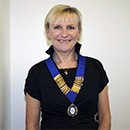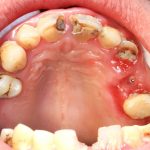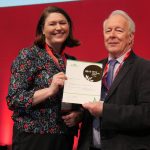Student dentist CHARLOTTE GENTRY reflects on her course…
“As I approach the final stretch of my course, I feel now would be a good time to reflect on what I wish I had known when I started. I think lots of these conclusions are probably common to many students and dentists, so, if you’re a student reading this, take note! • Time flies – that five-year cloud that looms over you, as you begin the first year really isn’t as bad as it seems. When I started the course, I couldn’t help but see a long, daunting the journey ahead and I wished my time away. Cliché maybe – but when you only have five years before you’re sent out into the big wide world, and these five years are coming scarily too close to the end. On reflection, I wish I had appreciated and enjoyed every second more than I did.
• The days really are as long as you’ve heard – before I actually began training, everyone I spoke to told me that dentistry is a 9-5 course. I found myself thinking, “this has to be an exaggeration” – it’s not. Obviously, four years in, I’m used to it, but I should really have tried to manage my time better from the start. Had I done so, I might have saved myself some stress! • It’s ok to ask for help – being surrounded by so many incredibly intelligent people who seem to understand things first-time round can make for an intimidating environment. I found this particularly to be the case for me and other colleagues who lack confidence. If I could go back, I would ask for more help when I needed it, rather than struggling and stressing myself out. We’re all learning, after all!
• You aren’t going to leave knowing everything – before beginning training, you look at professionals such as dentists and think they know everything in their field. This meant I embarked on the course thinking I needed to know everything by the time I
came out. I wish I had known it’s ok if you have to look something up in the BNF – and that there are postgraduate courses for a reason!
• Sometimes ‘textbook’ methods aren’t always the best – for every clinical procedure there are detailed, step-by-step methodologies on how to do something. When starting clinical work, you feel you have to follow these to a tee for every clinical scenario; you then find yourself wondering why something isn’t working. Every patient and the scenario is unique, and sometimes you have to mix up the way you work to achieve a good result!
• File your work – this may seem obvious, but keeping on track of filing is something I’ve found all we dental students struggle with! You get in from a long day and just throw your lecture notes onto an already sky-high pile. Exam time comes and you’re a disorganised mess – adding to the stress at an already demanding time. For any dental students reading this, filing stuff straight away is my number one top tip for you! Before you know it, finals will be upon you, at which the point you’ll be grateful you know where to find those notes on that dental public health
lecture from the second year!
• Those ‘pointless’ lectures are actually really important – you sit through the first year and wonder “how is this relevant to me?”. It’s only when you become a clinical student that you realise you should have already learnt those drug interactions and understood diseases like herpes and pemphigus and their effects on the oral cavity! I wish I had taken the time to properly understand things then and there; it would have saved so much work and time in the already hectic clinical years.
• Be a sponge – heading for those extra sessions on clinic can seem like far too much effort when you could be having a lie-in instead. It’s easy to forget you only have a finite amount of time at dental school; use it wisely and soak everything up! Observe
consultants doing fascinating surgical procedures, get those textbooks out, read journals. It all sounds like too much effort when you’re 19 and want to have fun, yet the minute you get on the clinic and start treating patients, this extra knowledge can really add to your learning and understanding.”














